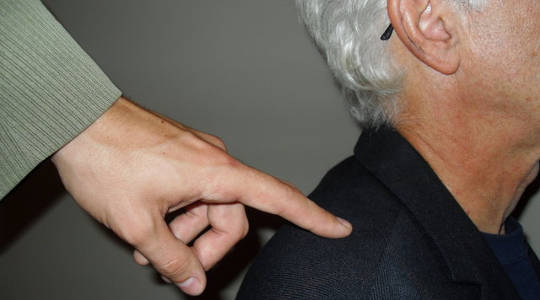
For me, an unrecognized, unexpressed feeling is like a persistent hand tapping on my shoulder. If I don’t give the feeling what it wants, acknowledgement and expression, the tapping gets more insistent. The feeling pulls more and more of my attention away from the present moment.
If I ignore this feeling, over time it robs me of my ability to function in the present. The unexpressed feeling eventually will become raucous and demanding, and insist that I pay attention.
The tapping on my shoulder says,
“Hey, remember me, I’m your sadness about how your father treated you.”
That’s what the sadness, or any emotion, wants: attention, acknowledgement, and expression, conscious expression.
Conscious means, “I know this is sadness.” If I don’t say to the sadness, “OK, I hear you, you’re right. I do feel sad about that,” the sadness will pounce on every natural loss I feel, in this case about men and authority, and grow larger and more insistent. Eventually it will become a 2” x 4” club whacking me on my head emotionally until I do pay attention.
Some people think they can simply ‘channel’ their anger into physical activity such as sports or exercise. But for healing to occur, consciousness is required.
We must be conscious that we have the feeling. We may or may not know its cause – that part is optional. Consciousness and externalization are not optional.
When It's Healthy to Not Express Your Feelings
There are times when the present situation or the people around me do not feel safe enough for me to be vulnerable and share my intimate emotions. In this case, it is healthy not to express my feelings.
I must acknowledge that I feel them, at least to myself, but then I can put them on a metaphorical shelf. I promise them I will get back to them soon, within days. Then when it is safe, I can invite them into my present awareness and give them what they seek: expression.
We can plan a Shelf Day when we create the time, space and energy to reach up to our ‘shelf’ and invite whatever feelings we’ve put there to come down so that we can express them. A benefit of doing this is to remind our self that we have control over whether, when, how, and to whom we express our feelings.
Moving Into Awareness and Expressing Emotions
It is a great gift to our self to acknowledge and express a long-suppressed emotion. First this act frees up energy, and second, it keeps the awareness moving, and this movement is a key to health.
Often the most challenging and the darkest times are when we feel ‘stuck’. What is stuck is this movement into awareness and the subsequent expression of emotion.
When we have the courage to express the truth of what we feel, that slice of present awareness at the top of the circle opens to receive the next feeling; we can be responsive to whatever comes next. We are back in the flow of our lives, our energy no longer drained or blocked by a piece of ‘unfinished business’. Instead of using up energy to hold back our natural emotions, all our energy is available in the present, to express our authentic emotions, who we really are, our essence.
Feelings Are Not Logical
Another quality of health is the recognition that the process of awareness and movement is more important than the content of what we are aware of. The expression is more important than what we express. This goes against the messages from our reductionist, ego-based culture, which wants to know not only what the feeling is but also why we feel it. The culture wants a rationale for the story, a justification.
To try to satisfy the culture’s obsession with exactly what the feeling is, and why we feel it, propels us quickly up into our heads. Our mind wants to fix the ‘problem’, to find a solution. Our intellect tries to figure it out. And if we can’t come up with exactly what the feeling is or a valid reason why we feel it, suddenly we have lost permission to feel it.
It is our responsibility to give ourselves the permission to do what we need to do to be healthy – feel our natural emotions that are tapping on our shoulder. Sometimes that means trusting the validity of the feeling without knowing where it came from. That is the beauty and power, even the purity, of a natural emotion. To honor the feeling, to be healthy, we give it expression.
Spiritual Practice: “Flowing Hearts”
Find a peaceful time and place to sit as you are – you do not need any special props.
Imagine that you are in the presence of wise and loving people, guests from the spiritual realm. These guests are spiritual masters, women and men from the ancient traditions and tribes who come now into your awareness for the sole purpose of loving you.
All of them – and there are many – surround you physically and wrap you in their love, a pure and powerful love flowing from their hearts into your heart. Your only task is to receive what is being freely offered.
Breathe this abundant love into your heart, let it join with the blood of your heart and be distributed throughout your whole body. This love floods your being, and brings reassurance, abundance, comfort, energy, strength and confidence. And as long as you keep breathing, and remain aware, your spiritual guests continue to bring you all the love you need.
Published by O Books. ISBN: 978-1-78279-978-8 (Paperback)
£12.99 $20.95, EISBN: 978-1-78279-979-5 (e-book) £7.99 $12.99
Article Source
 Essence: The Emotional Path to Spirit
Essence: The Emotional Path to Spirit
by Jacob Watson.
Click here for more info and/or to order this book.
About the Author
 Jacob Watson grew up in a New England family, attended traditional schools, then took a hard turn left. He founded an alternative school, became a grief counselor and worked with HIV/AIDS, Hospice, the Elisabeth Kubler-Ross Center and the Center for Grieving Children. He is the founding Abbot of the Chaplaincy Institute of Maine, and devotes his life to teaching, writing and prayer.
Jacob Watson grew up in a New England family, attended traditional schools, then took a hard turn left. He founded an alternative school, became a grief counselor and worked with HIV/AIDS, Hospice, the Elisabeth Kubler-Ross Center and the Center for Grieving Children. He is the founding Abbot of the Chaplaincy Institute of Maine, and devotes his life to teaching, writing and prayer.























